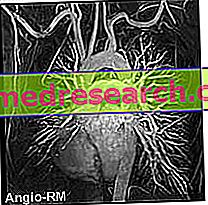Disease treatment
Because the causes of schizophrenia are still little known today, the treatments are based on the elimination of symptoms. In particular the available treatments include antipsychotics and various psychosocial treatments.

In 1990 new, second-generation or atypical antipsychotics were developed. Among these, clozapine (Clorazil) is effective against psychotic symptoms such as hallucinations, delusions and isolation from reality. However clozapine can sometimes cause a serious disorder known as agranulocytosis, which consists of the loss of leukocytes in the blood, white blood cells important for fighting infections. Thus individuals using clozapine will need to monitor their leukocytes every one to two weeks.
Other atypical antipsychotics that have been developed that do not cause agranulocytosis are for example: Risperdal, Zyprexa, Seroquel, Geodon, Abilify and others. The most common adverse effects may be related to physical movements, such as stiffness, tremors or persistent muscle spasms.
It is important to follow the doctor's advice, especially with regards to how the drug is suspended, which must be done gradually and never suddenly. Among the adverse effects of antipsychotics, there are many which then tend to disappear within a few days of intake. People who follow antipsychotic therapy should not drive until they adapt to the treatment regimen undertaken. Some of these adverse effects are, for example, dizziness when changing position, drowsiness, tachycardia and others.
It is important to remember that atypical antipsychotics can cause greater weight gain and metabolism changes. Therefore they can increase the risk of diabetes and high cholesterol.
As far as psychosocial treatment is concerned, this can help people suffering from schizophrenia who are already stabilized by therapeutic treatment. Psychosocial therapy can help patients overcome the daily challenges they face due to schizophrenia, such as difficulty communicating, caring for themselves and the ability to relate. Individuals receiving this type of treatment are more likely to continue therapy and are less likely to experience relapse.
The psychosocial program includes disease management skills, rehabilitation, family education, cognitive behavioral therapy and group therapy.
See also: Drugs to cure Schizophrenia »
How to help a schizophrenic person
First of all, the patient's family represents the first form of help for the patient himself, as the patient often tends not to undertake any therapeutic regimen. They tend to think they do not need help, because they are convinced that hallucinations and manias are real.
In this case the intervention of family and friends is essential. Laws vary from country to country and it can be difficult to force a person to seek treatment through a treatment regimen or through hospitalization. However, when there are difficult cases, such as cases of aggression towards family members or towards the patient himself, the police must be called and then proceed with hospitalization.
Hospital treatment will be carried out in an emergency room, where a mental health professional will assess whether voluntary or involuntary admission is required. For individuals who do not voluntarily admit, the law provides that the doctor must witness the psychotic behavior, while the family members must help the doctors to make a decision about the therapy.
After the hospitalization period, the family and friends will have to help their loved one with schizophrenia to maintain the treatment regimen they have undertaken. If suddenly the sick person should stop therapy, the symptoms will appear again; the danger lies in the severity with which they can reappear.
It is important not to stress or criticize individuals with mental illnesses, also because this could contribute to worsening the symptoms. Telling them when they are doing a good job is the best way to help them.
What are the prospects for the future?
Although there is currently no cure, some truly effective treatments are available. Many people affected by this disease learn to be independent enough to lead a satisfying life.
Research continues towards understanding genetic, neuronal and behavioral factors to try to understand the causes and how to prevent onset.



